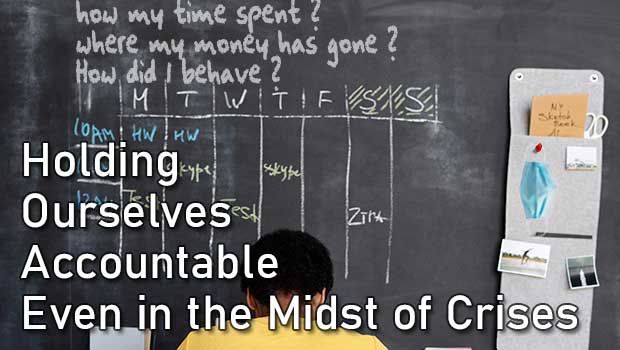These are difficult times for many people around the world regarding their health, their livelihoods, their families and other relationships, and numerous other aspects of their lives. Yet, as many have said, this is the new normal. As Muslims, we believe it is important to accept the reality of the present and work with it in the most efficient and optimistic manner possible. We might not be the cause of all that has happened to us in our lives and we are not accountable for what is out of our control, but we certainly are accountable for how we respond to every situation. Holding on to one’s purpose is crucial in times of ease and times of difficulty. Holding ourselves accountable is a part of our faith, and we have limited time – this life, from the age of accountability (starting with puberty) to death – to do so. Thus, the question is raised: how do we hold ourselves accountable while encountering a crisis such as this global pandemic?
Reminding Us About Humility
First, it is crucial that we recognize the role of humility in times of hardship. The hardship affecting us – be it a small inconvenience or an infectious and sometimes deadly virus, or any other difficulty – should remind us to humble ourselves to Allah. Allah is in control. Allah is aware. Allah’s wisdom is in effect. Allah’s knowledge is all-encompassing. Allah’s mercy is manifest in ways we cannot imagine or comprehend. Hardships remind us about Allah’s power and sovereignty, as Allah says, “Blessed is He in whose hand is all authority…” (Qur’an 67:1), and oftentimes these hardships come at times when individuals, communities, or societies lose their humility and forget their dependence upon Allah. One of the greatest ways to hold ourselves accountable, therefore, is by means of reflecting on our current state of humility and what we need to do to increase it. If, during a hardship, we find ourselves committing sins as individuals or nations, then the true exemplification of humility should lead us to remorse and repentance, recognizing that Allah is the King of all kings and the one who accepts sincere repentance.
When our father and mother, Adam and Hawaa’, were reprimanded for eating from the tree, their response was one of genuine humility: “They replied, ‘Our Lord! We have wronged ourselves. If You do not forgive us and have mercy on us, we will certainly be losers’” (Qur’an 7:23). The devil, when condemned for disobeying a clear command of God, responded with arrogance rather than humility, and he blamed God instead of accepting responsibility for his action: “The devil said, ‘Because You have put me in the wrong, I will lie in ambush for them on Your Straight Path’” (Qur’an 7:16).
Adam and Hawaa’ chose the path of humility and redemption, after which the remorseful believer is raised to the highest of ranks. The devil, however, chose pride and doubling down on sin, and the end result is a rank that is lowest of the low. May Allah grant us humility in times of ease and times of hardship.
Reminding Us About Our Purpose and Destination
Second, hardship should remind us about the purpose of life and the destination we seek. Recognizing one’s purpose, as clarified to us by the Creator, should lead us to productive lifestyles that remain consistent in times of hardship. Allah says: “…the One who created death and life in order to test you as to which of you is best in deeds, and He is the Almighty, the Ever-Merciful” (Qur’an 67:2).While one’s worldly life might be in tumult, the believer should never assume that he or she is “completely lost” in life due to worldly struggles. So long as believers know and act upon their ultimate objective — to pass the test as to who is best in deeds — their lives are not ever truly “lost.” In fact, one of the greatest reminders of holding ourselves accountable is found in the above verse when Allah mentions death before life. Allah mentions death before life for several possible reasons, all of which aid in self-accountability:
1) Death is mentioned before life because death is the state we existed in before we were born. Allah created our pre-existence just as He created our existence. “How do you disbelieve in Allah when you were dead, then He gave you life, then He caused your death, then He gave you life [for the Day of Resurrection], and then to Him you all return” (Qur’an 2:28).
2) Death is mentioned before life because death is a more powerful reminder that can potentially awaken the hardened heart. When one becomes distracted by this life and overly attached to it, the reminder of death has the potential to jolt their psycho-spiritual state back to their true purpose so that they may hold themselves accountable.
3) Death and life in this verse are like this world (ad-dunya) and the afterlife (al-aakhirah). This life, with all of its struggles and its tests, ends with death – the departure to the afterlife. The afterlife, however, is eternal, and thus, in that abode there is no death.
When the believer is reminded about the transient nature of this world, that this life is a test, and that Allah gave us clear purpose and a life mission, the reminder serves to benefit the believers by increasing them in sincerity, motivation, resilience, and self-accountability. A practical advice on this note, thus, would be to reflect regularly on the question, “What have I prepared for my afterlife?” Writing out what has been accomplished thus far may or may not be motivational to the believer, but what matters more is the present strategy. What goals do you have now to better prepare for the afterlife, and how are you going to regularly fulfill those goals (that is, how to make the necessary actions into habits)? What needs to change so that your death will bring you more joy and less regret? May Allah grant us righteous and productive lives and a righteous death.
Reminding Us About the Need to Prepare
Third, a powerful reminder to help the believers hold themselves accountable is the saying, “Whoever holds himself accountable in this life will find their accountability on the Day of Judgment easier. Whoever does not hold himself accountable in this life will find their accountability on the Day of Judgment more difficult” (this saying is sometimes attributed to Al-Hasan Al-Baṣri). Whether or not we face ease or difficulty, we have limited time to prepare for what truly lasts and what truly matters. While we are not taken to account for our actions while we are in this world, this world serves as the only opportunity to prepare for the afterlife, after which there is accountability without opportunity for redemptive actions. A practical advice, therefore, would be to recite the Qur’an regularly to increase these reminders about the afterlife, as well as to seek knowledge consistently so that our foundation for faith and understanding are increasingly strong. A practical question-based activity would be “How do I hold myself accountable on a daily basis?” and “Where am I today in my progress towards easier accountability on the Day of Judgment?”
Struggles and hardships are part and parcel of this life, and we ask Allah to ease our hardships and to grant us relief and reward. Holding ourselves accountable helps us to cope with these hardships with humility, helps us remain true to our purpose of successfully passing the test of this life, and helps us prepare for our accountability so as to celebrate more on the day we depart this transient life and meet Allah, the King of all kings.






